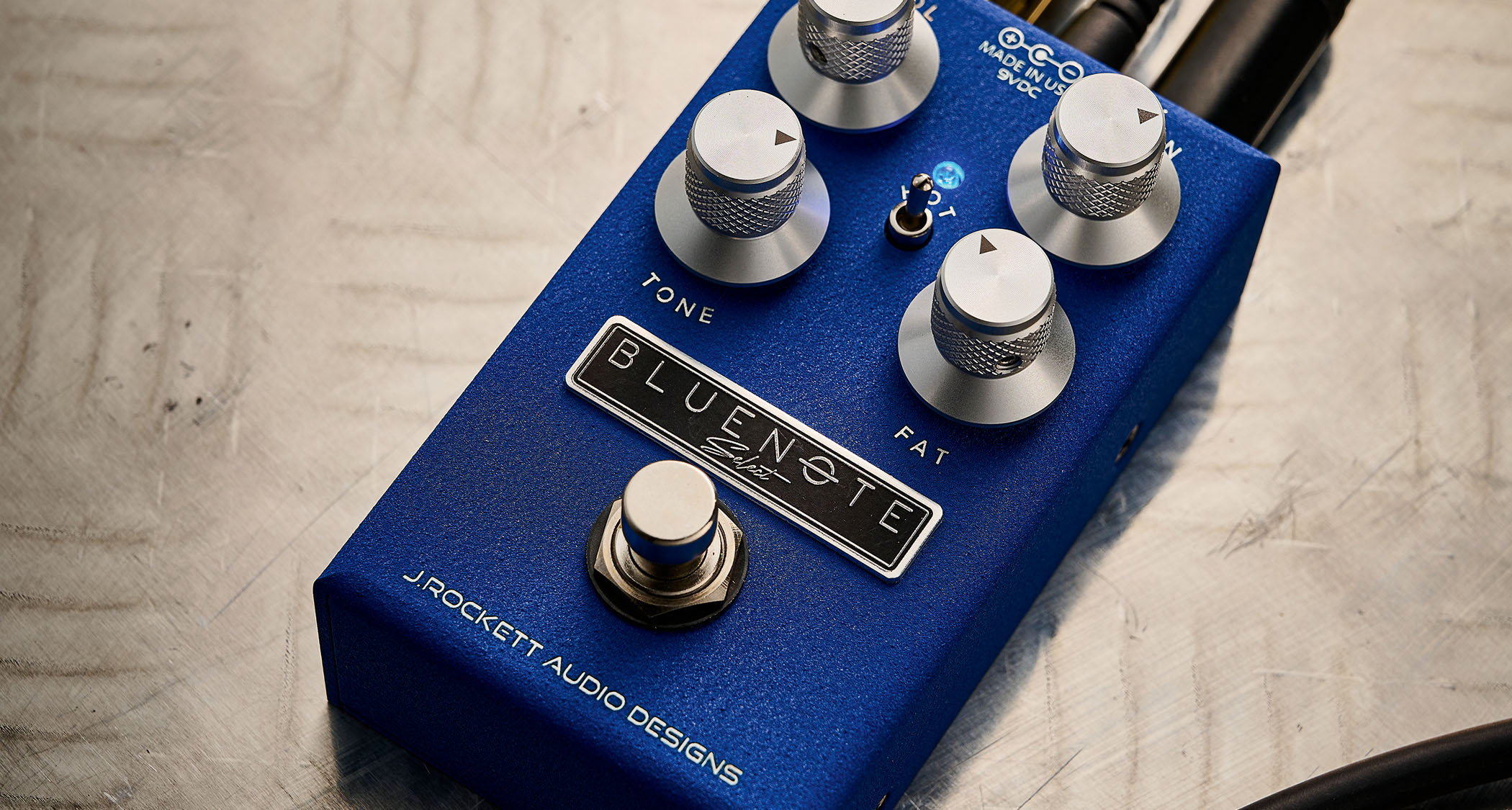“Trying to emulate these different players was a challenge. Chris Poland to Marty Friedman is like night and day. But that’s what excites me”: Glen Drover grew up idolizing Megadeth and King Diamond’s guitar heroes – then he had to step into their shoes
Inspired by Yngwie Malmsteen but weaned on Black Sabbath, the Canadian guitarist discusses the new gear and new skills he’s racking up as his own band Withering Scorn takes flight
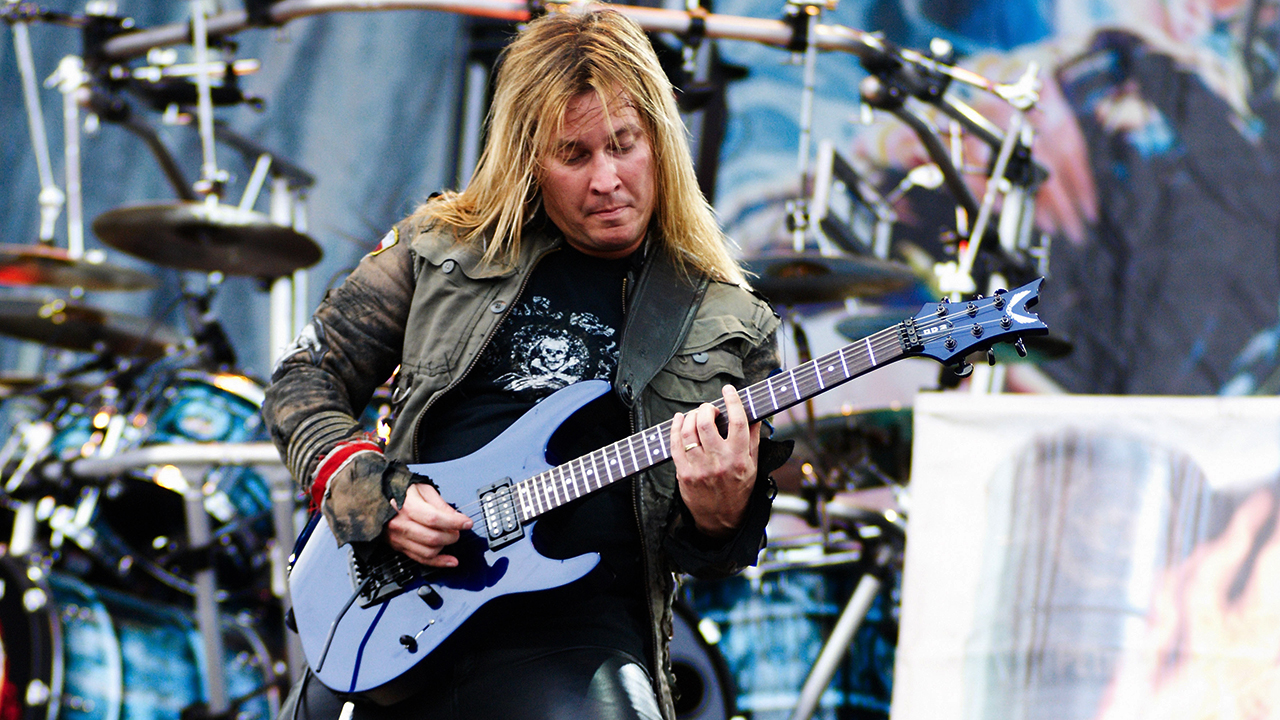
Like many kids growing up in the ‘70s, Glen Drover was drawn to the guitar sounds of Ace Frehley and Tony Iommi – but it wasn’t until he heard ‘80s neo-classical shredhead Yngwie Malmsteen that his playing entirely took form.
“Lots of bands help shape my direction,” says the Canadian guitarist, who formed Eidolon with his brother, drummer Shawn Drover, and went on to play with Megadeth, King Diamond, Testament and others.
“When we started to write for Eidolon, there were a lot of different branches off that rock tree that we were influenced by. Nobody’s completely unique. It’s like Robert Plant said – ‘We’re all thieves.’”
Lately he’s been working on Withering Scorn’s second record, tentatively due in 2025. Asked what he’s learned along the way, he replies: “Be true to yourself. Don’t try to emulate someone else. Try to make something unique that you can put your name on.”
There’s more: “If you’re going to collaborate, which a lot of people do, the goal is to make it sound cohesive. There’s so much information out there, and you can learn by video and literature – it's crazy. Take your influences and inspirations, put them into something, and try and spit them out in your own way.”
What inspired you to pick up the guitar?
“Kiss was the first band I heard with a distorted hard rock guitar sound, so I’d say Ace Frehley. Then, when I was eight or nine, and I actually started playing and got excited about the instrument, I discovered Black Sabbath.
Get The Pick Newsletter
All the latest guitar news, interviews, lessons, reviews, deals and more, direct to your inbox!
“That’s when things started to pick up and my playing started to excel. I learned how to play Paranoid and Iron Man, which was my introduction to barre chords. Before long, I was trying to learn their whole repertoire just because I was picking it up easily.”
Why do you think you were drawn to Sabbath’s early records?
“It’s slower – the songs aren’t as difficult to play compared to trying to learn Rush or something. That was a good place to start. I’m still a Sabbath fanatic after all these years.”
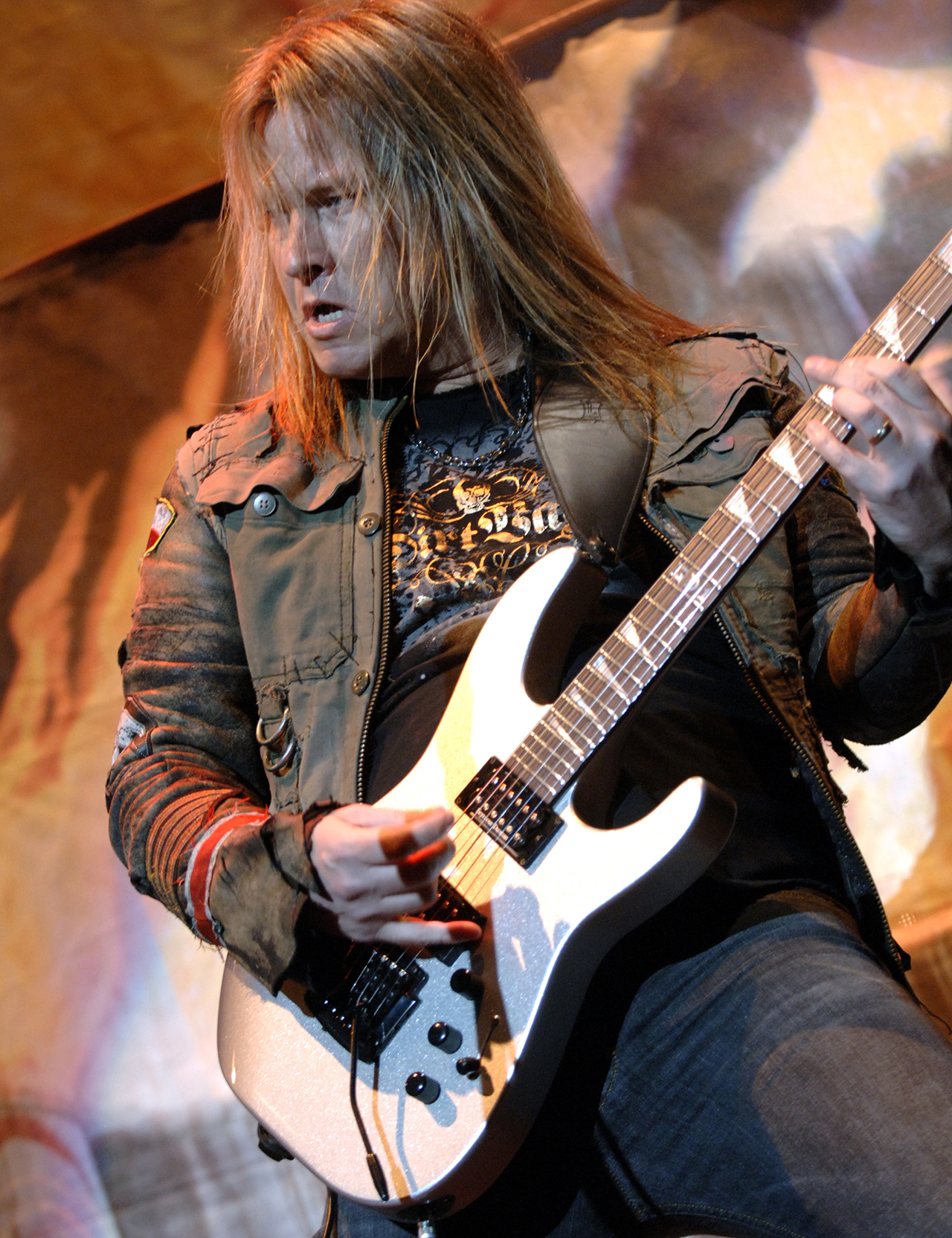
How did you get into thrash and power metal, leading up to forming Eidolon with Shawn?
“In the early ’80s there was a lot of growth in metal and there were speed metal bands coming out like Metallica. Exodus was a big one for me. Of course, Yngwie Malmsteen – the first time I heard him, which I guess would have been in about ’82 or ’83 when he joined Alcatrazz, was the beginning.
“At that point there was a major leap in guitar playing. Everybody was trying to play like that; it was very inspiring. For me, man, Yngwie was like, ‘Wow, that’s inhuman – you can’t play like that!’ He inspired tons of people, and still does to this day.”
What did your rig look like when you formed Eidolon?
“I went through a lot of different stuff. I was really into the Valvestate Marshall. I was doing King Diamond at the same time as our stuff, and me and Andy LaRocque were using Marshall Valvestate 4x12s for the most part.
“I’ve always loved the Boss Overdrive; it's a great pedal. It doesn't matter what amp I use – I’ll put that overdrive in front of it. During that period, the ADA preamp was still popular; I would use that with a power amp or through a Marshall cabinet.”
What guitars did you lean on most?
“My main one was a Charvel Model 5 that I bought in ’88. It’s the best money I’ve ever spent in my life. I was like 18 and they let me make monthly payments for a year or so. I was in heaven. To this day, that's my favorite guitar.”
Did your gear change much when you joined Megadeth?
“Going through King Diamond and Megadeth, at one point, it was all about ESP. I was using the ESP M-1000; it’s like a Super Strat. That type of guitar is what I’ve always been kind of attracted to. And I was playing custom Dean Cadillacs when I was in Megadeth too.”
The Marty Friedman stuff is kind of structured in a way where you really can’t venture off too much or too far – which I wouldn’t anyway
How did your approach change when you joined Megadeth?
“I was stepping into someone else’s shoes. In King Diamond there were a few guitarists before me; in Megadeth it was the same thing. I looked at it from a fan standpoint; I thought, ‘How would I want to hear the guitar solo I heard on the album?’
“There’s these identifiable moments; but at the same time, you want to put your own spin on it and have your DNA there. It’s a combination of both, which is very important and natural. If I’m going to see a band, and there’s a different guitar player, I want to hear the solo I know, to a certain point.
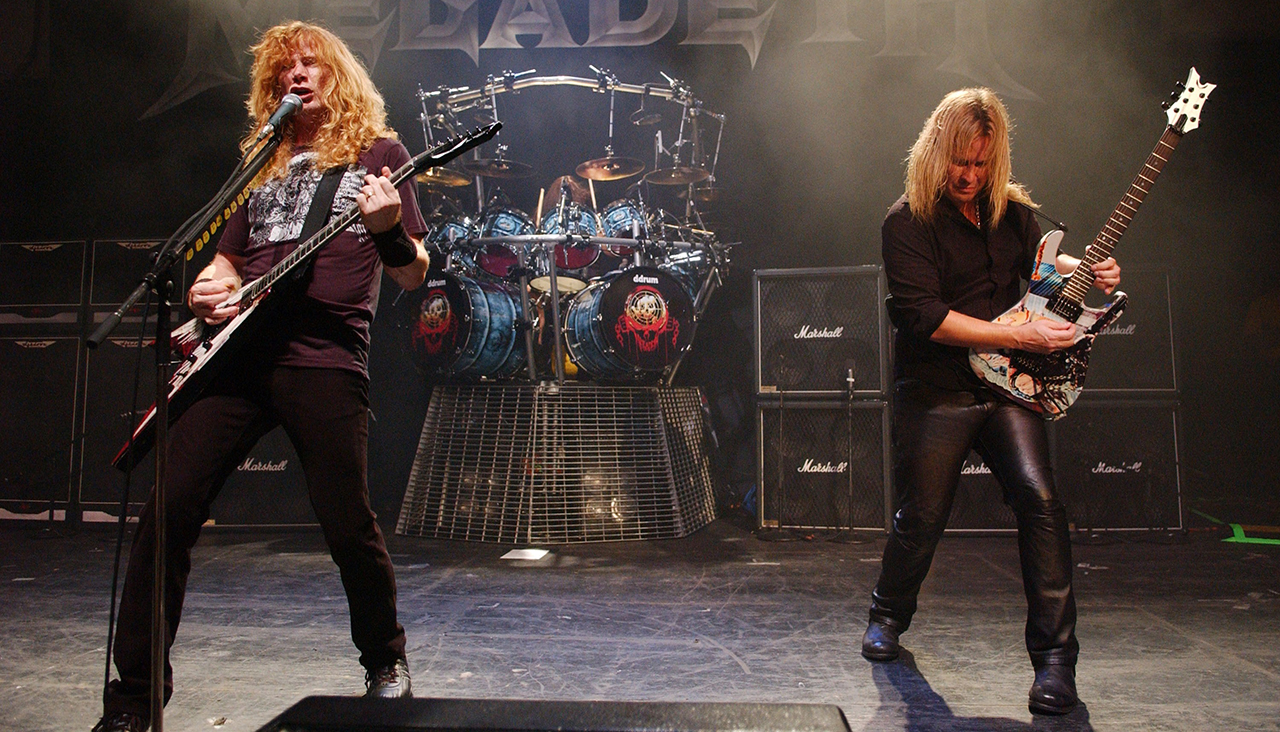
“I also want to hear what that guitar player has to offer. That was my approach. Dave Mustaine was a little bit more – you know, he really wanted you to nail those solos as closely as possible, which is fine. Whereas with Kind Diamond you could venture off a little bit more.”
What was the most challenging Megadeth song and solo to undertake?
“The Marty Friedman stuff is kind of structured in a way where you really can’t venture off too much or too far – which I wouldn’t anyway. They were structured so heavily that if you missed something, you could fall off track a little bit. So, I found his stuff to be more challenging.
“With solos like Symphony of Destruction, Tornado of Souls, Holy Wars or Hanger 18 – the fan favorites – I wanted to keep them real close to how they were recorded. It was very much, ‘Let’s get those Marty Friedman solos down really well.’ It’s not an adlib kind of thing; it was really well put together.
“Trying to emulate all these different guitar players was a little bit of a challenge too. They’re all different; Chris Poland to Marty Friedman is like night and day, you know? But I liked the challenge; that’s what excites me.”
What's your biggest takeaway from playing guitar alongside Dave in Megadeth?
“If you want to play in a band that size, there's a lot of things you have to learn along the way, like how to conduct yourself, how to dress – so many different things. I definitely learned a lot that put me more on a pro level.
“Going into King Diamond, I was a little bit green. I learned a lot from King, and then I went into Megadeth and learned a lot more. I’m very grateful that I learned these things and had the opportunity to actually play with these bands I grew up idolizing. Priceless stuff!’
I’m proud of all the bands I’ve played with. They were all unique situations and very exciting
Lately you’ve been working on your latest project, Withering Scorn. What’s the story there?
“I’m not just a guitar player anymore – now, I'm an audio engineer, blah, blah, blah. And that's fine because I have control over certain things, and at the end of the day, they come out the way I want. We started this project two or three years ago, and we've already put out one album, Prophets of Demise.
“We just signed to Frontiers for a four-album deal. We’re about 70 percent finished recording the new album. I’m not sure when it's going to be released, but I would imagine this coming summer. Things are going really, really well.”
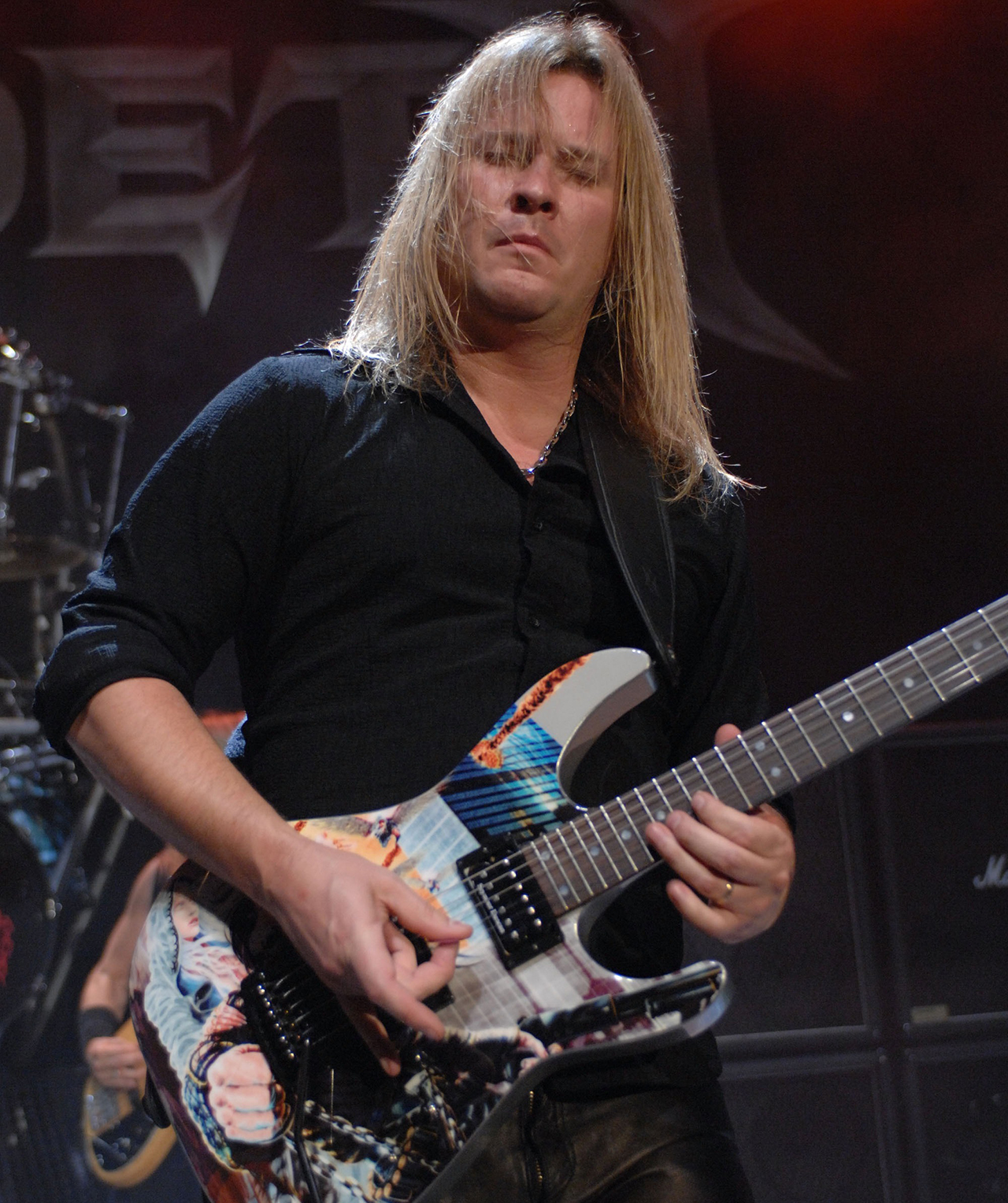
What’s the state of your rig these days?
“I still have my Super Strat guitars, but the Gibson Les Paul has always been a favorite. I have a couple that I love to death; one is the Modern. It’s a fairly recent one that I’ve had for a couple of years. All the pots are push/pull. I have a Traditional Les Paul too.
“I’ve just discovered some new plugins that have become game-changers in helping me achieve the tones I want and take them to the next level. For guitar, I've been using the Kemper and some of my favorite profiles, especially the 5150, along with a Celestion speaker plugin. Combining profiles from the Kemper has been great. The results are amazing.”
What are you most proud of when you reflect on your career?
“I would have to say I’m proud of all the bands I’ve played with. They were all unique situations and very exciting. I’ve learned a lot from them. And, of course, I’m very proud of the projects me and my brother Shawn have done together.”
- Prophets of Demise is on sale now.
Andrew Daly is an iced-coffee-addicted, oddball Telecaster-playing, alfredo pasta-loving journalist from Long Island, NY, who, in addition to being a contributing writer for Guitar World, scribes for Bass Player, Guitar Player, Guitarist, and MusicRadar. Andrew has interviewed favorites like Ace Frehley, Johnny Marr, Vito Bratta, Bruce Kulick, Joe Perry, Brad Whitford, Tom Morello, Rich Robinson, and Paul Stanley, while his all-time favorite (rhythm player), Keith Richards, continues to elude him.
Guitar World Discussion: Who is the most underrated guitar player of all time?
Ozzy Osbourne’s solo band has long been a proving ground for metal’s most outstanding players. From Randy Rhoads to Zakk Wylde, via Brad Gillis and Gus G, here are all the players – and nearly players – in the Osbourne saga












